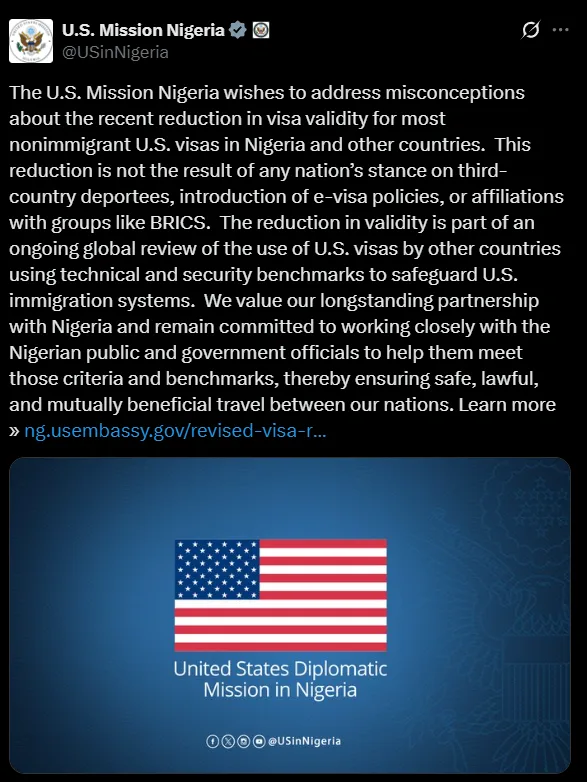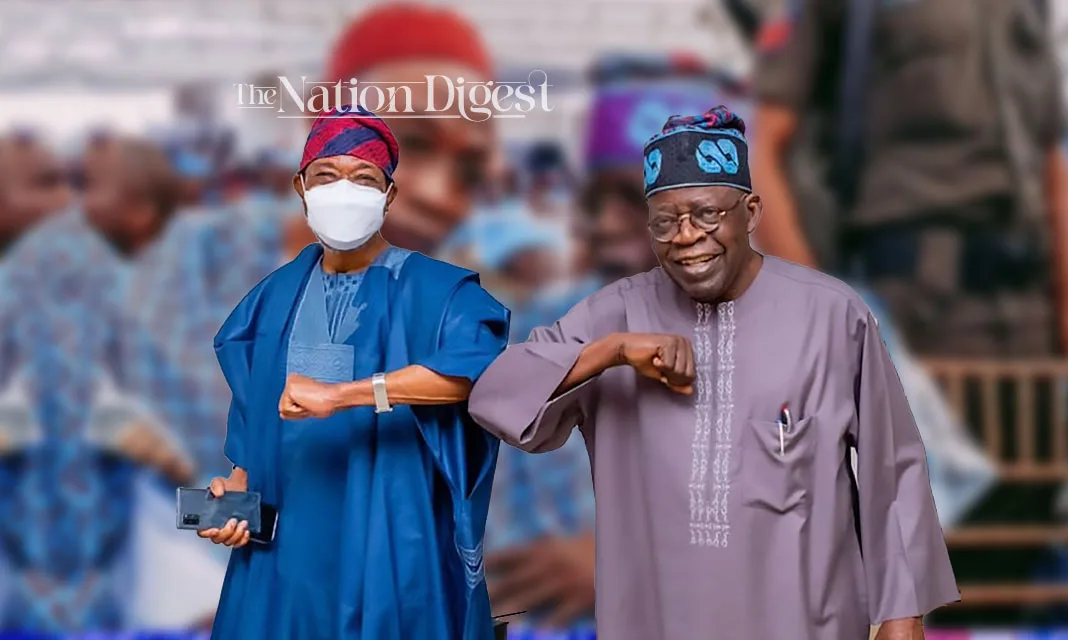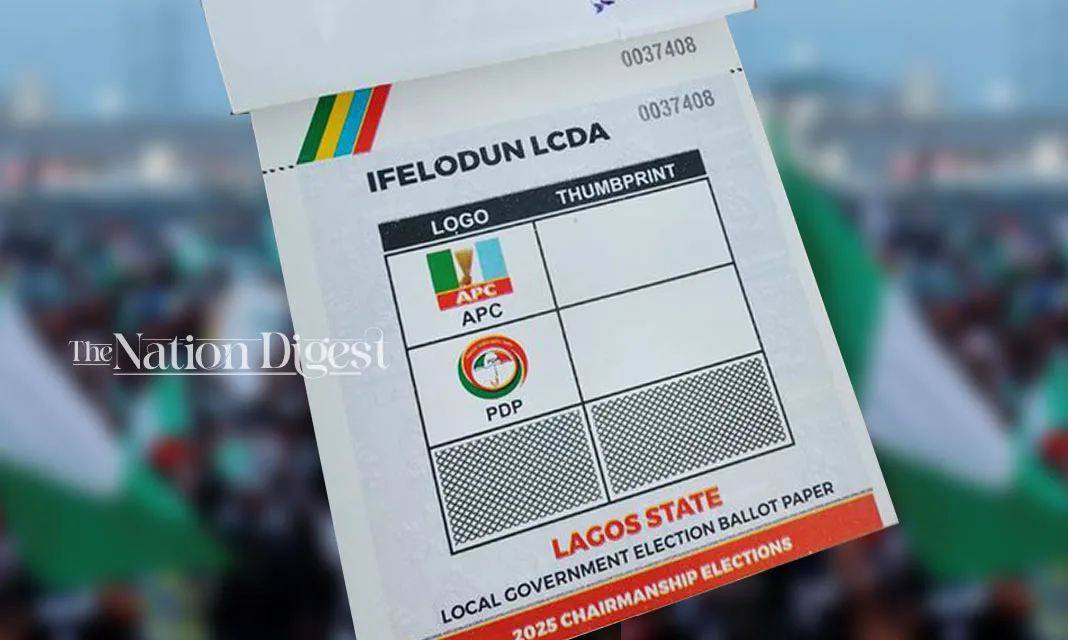When news broke about the U.S.– Nigeria visa cut, it triggered widespread concern and speculation among Nigerians. As reported by The Nation Digest News, the U.S. Mission in Nigeria had reduced the validity period for most nonimmigrant visas, sparking questions across the country. Was the decision linked to Nigeria’s alignment with BRICS? A response to deportation policies? Or a sign of growing tension in U.S.–Nigeria relations?
The U.S. Mission has now provided clarity, stating unequivocally that the recent visa policy change is not targeted at Nigeria alone. Instead, it is part of a broader global review aimed at enhancing security measures and aligning travel protocols across countries. According to the Mission, the decision was not politically motivated or retaliatory but based on objective technical and security benchmarks.

In their words, “This reduction is not the result of any nation’s stance on third-country deportees, introduction of e-visa policies, or affiliations with groups like BRICS. It is part of an ongoing global review.”
That matters. It shifts the narrative from “Nigeria is being targeted” to “Nigeria is one of many nations affected.” Still, for many Nigerians, that doesn’t soften the sting. Travel, business, education, and family visits have just become a lot more complicated. The reality on the ground remains frustrating.
@SamuelTutu voiced what many feel: “This clarity is good, but please provide dates to enable us to book interviews. Those long waiting periods aren’t good for businesses!” He’s not wrong. Whether the change is global or not, the consequences feel very personal for Nigerian applicants.
Nigerians React:
Social media lit up the moment the announcement was made. While some praised the U.S. for being transparent, others expressed anger, disappointment, and even deep skepticism.
Take @godswillefe75, for example. He wrote,
“Kindly revert back to the 5-year validity era, provided Nigeria does the same. The Tinubu government may not have consulted career diplomats before this policy somersault.”
His frustration speaks to a wider concern: why aren’t Nigeria’s diplomatic channels doing more to ensure reciprocity?
For others, the issue is less about policy and more about process. @ChidiOkoroafor said,
“I wish the mission could work on faster ways of getting visa interview appointments, and hasten the drop-box process. This will enable applicants on B1/B2 who must necessarily travel every year to still meet up.”
Clearly, this U.S. – Nigeria visa cut is not just about validity. It’s also about timelines, backlogs, and uncertainty. With the new rule limiting some visas to a single entry and just three months of validity, people who travel frequently, especially business owners are stuck in a frustrating loop of reapplying, rebooking, and waiting.
Then there’s the raw anger, like what we saw from @PrinceVictorNteke:
“This is totally unacceptable. Why do the American Government think they can twist the mental processes of all Nigerians? A country of more than 200 million can’t be deceived so cheaply.”
That anger may be emotional, but it reflects real feelings of being unfairly treated on the global stage. After all, why is Nigeria being treated differently? Or is it?
The U.S. says no—but perception, especially in global diplomacy, is often just as powerful as fact.
The Bigger Picture
So, if this policy isn’t targeted at Nigeria, why does it feel like it is?
According to the U.S. Mission, the reduction in visa validity is part of “an ongoing global review of the use of U.S. visas by other countries using technical and security benchmarks.” In simpler terms, they’re updating their visa policy to reflect how people actually use their visas—and how securely countries handle immigration data.
But this global narrative doesn’t erase the very local impact Nigerians are feeling. Just ask @swaagsphotos:
“Oh, okay, noted. But for how long will this be in effect?” That’s the big question. The policy might be technical, but its effects are emotional, practical, and deeply personal.
And let’s not ignore the issue of reciprocity. As @godswillefe75 hinted, the idea that Nigeria might’ve reduced its own visa offerings without broader consultation only adds to the sense that we’re being reactive rather than proactive in global diplomacy.
Some users, like @KelNadi, took the opportunity to aim higher:
“Add restrictions on our politicians from visiting your country for medical and tourism. They should use the hospitals they built for poor Nigerians.”
It’s not just about visas, it’s about leadership, fairness, and respect. Nigerians are connecting this issue with broader frustrations about governance, accountability, and the seemingly endless cycle of privilege for the few and punishment for the many.
And yet, there’s also appreciation. @FranklinUzoma praised the clarity of the U.S. Mission, saying, “Africa leaders should fix their countries the way the U.S. Mission Nigeria and U.S. President is doing. Thank you again.”
So we’re seeing both ends of the emotional spectrum: frustration and admiration, skepticism and gratitude.
So Where Do We Go From Here?
It’s tempting to turn the U.S. – Nigeria visa cut into a political football, kicked around by both American and Nigerian critics. But at its heart, this issue is about people—students, business owners, tourists, families.
People like Chukwuma Chuks, who commented,
“You think after 3 months people will be confident to come back and stay in the queue for two years before they get another visa date?” That frustration is valid. The U.S. may view this as technical policy, but Nigerians feel the social and financial weight of every new hurdle.
That said, we can’t ignore what the U.S. Mission has clarified. This isn’t about punishing Nigeria. It’s about reforming a global visa framework that has grown outdated. In some ways, it’s about modernization. But modernization without empathy often leads to backlash.
There’s also room for growth on our side. The Nigerian government must now push for reciprocal visa terms. Our diplomatic corps must advocate with clarity and urgency, not just for longer visa validity, but for fair processing timelines and predictable interview scheduling.
At the same time, we must avoid conspiracies and exaggerated fears. No, the U.S. is not declaring Nigeria a failed state. No, this is not the end of bilateral relations. But it is a wake-up call, both for American diplomats to communicate more transparently and for Nigerian officials to respond with bold, informed diplomacy.
What Does This Mean for Nigerians?
The U.S.- Nigeria visa cut may not have been politically motivated, but it has created political waves. For many, it feels like one more reminder of the hurdles Nigerians face when trying to explore opportunities abroad.
The silver lining? This policy may be global, but the response can be national. Nigeria has the chance to stand tall, engage with U.S. officials respectfully, and push for policies that serve our citizens’ best interests. And if nothing else, this moment should remind our leaders—especially those who run to foreign hospitals—that home must be fixed first.
Now over to you: Have you been affected by the new U.S. visa policy? What changes would you like to see from both Nigeria and the U.S. Mission? Drop your thoughts, share your stories, and let’s make this conversation count.




